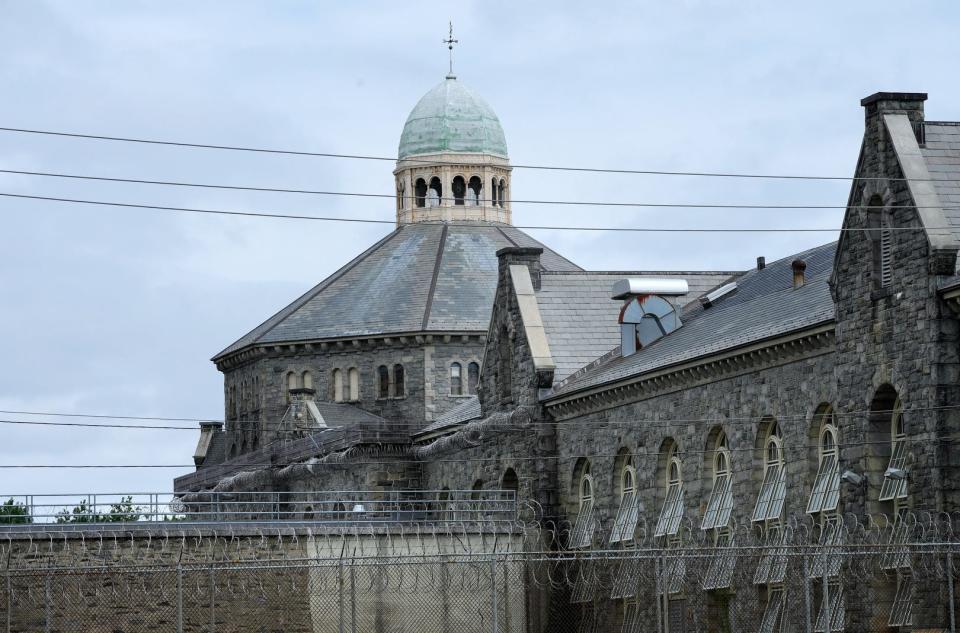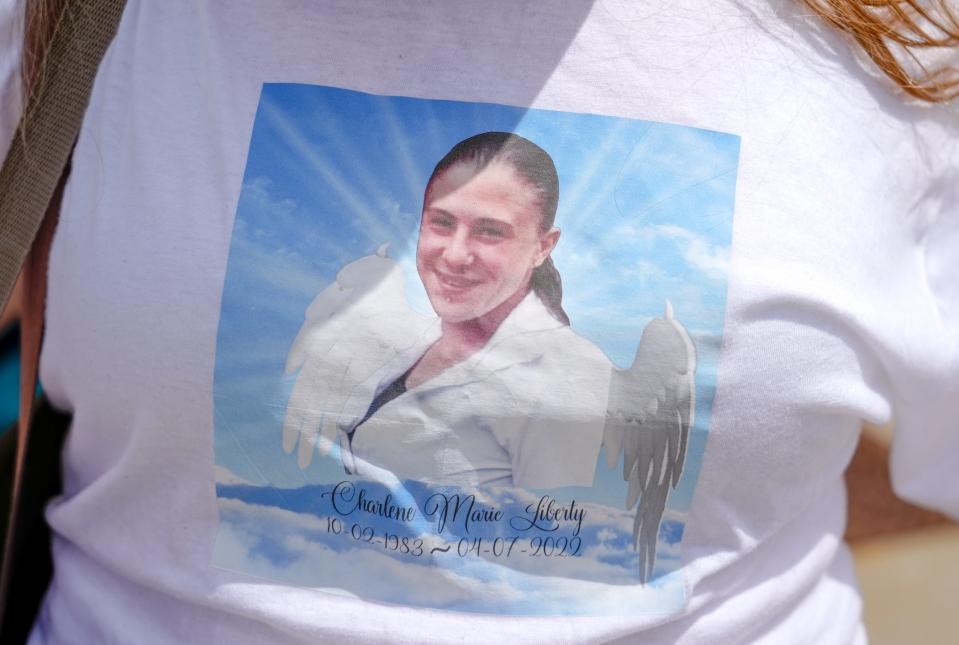Should Rhode Island limit use of solitary confinement? Hear those who lived it speak out.
PROVIDENCE – Charlene Liberty died last April after struggling for years with mental illness, but her allegations of inhumane treatment in Rhode Island's state prison prompted an ongoing lawsuit – and a renewed effort by lawmakers and former inmates on Thursday to sharply restrict the use of solitary confinement.
In an interview in May 2020, Department of Correction spokesman J.R. Ventura was quoted as saying: "There is no such thing as solitary confinement anymore, where inmates are isolated or deprived of human contact."
“Even in the most extreme of cases, where an inmate is a severe management problem, they are not placed in a solitary environment,” Ventura said. “People here have regular human interactions and their constitutional rights are respected."
But the lawsuit pending in U.S. District Court tells a different story, and at least two former inmates at the Adult Correctional Institutions in Cranston – and the sister of a third – headed to the State House on Thursday to tell their stories in an effort to persuade state lawmakers to end what they call "torture" in the ACI.
More on Charlene Liberty:Death of former inmate, Slater patient raises profile of lawsuit over treatment in prison

What's in the Solitary Confinement Reform Act?
Their efforts center on the latest version of an oft-seen bill to limit - rather than fully ban - the use of solitary confinement, which this year has been titled: the "Solitary Confinement Reform Act."
The aim: to limit what the state calls "restrictive housing" to "circumstances that pose a clear and direct threat" to other inmates and staff "for the shortest time possible," subject to review by a "restrictive housing oversight committee." The minimum requirement: "four hours out-of-cell each day."
The sponsors include Senators Jonathon Acosta, Tiara Mack, Joshua Miller, Meghan Kallman, Melissa Murray and Senate Judiciary Chairwoman Dawn Euer.
Charlene Liberty's sister says she went from depressed to severely suicidal because of solitary confinement
Charlene Liberty was the lead plaintiff in a pending lawsuit in U.S. District Court that lives beyond her death.
At the time of filing, the lawsuit described the then-36-year-old Charlene as a woman with "a long history of mental illness who … attempted suicide ... and self-mutilation."
"On May 16, 2019, after her return from the psychiatric hospital to [the Rhode Island Department of Corrections] she was immediately placed in the solitary confinement unit as punishment for her suicidal behavior," the lawsuit alleges.
"On June 4, 2019, [she] was still in solitary confinement," where she was allegedly driven to even more "serious self-injurious behaviors, including multiple suicide attempts."
The state's response: "When appropriate due to her behavior, plaintiff was housed in a suicide resistant cell in the Women’s Facility."
Charlene Liberty died on April 7, 2022, less than two months after she was discharged from the psychiatric wing of Eleanor Slater Hospital under circumstances that are still being investigated by the nonprofit agency Disability Rights Rhode Island.
Her sister, Elisha Liberty, appeared at Thursday's State House news conference to tell Charlene's story.
More on Charlene Liberty:'Victim of the system': Protest demands change after death of ex-Slater Hospital patient

"Before her passing, I watched my [sister's] mental health decline due to the conditions and regulations of solitary confinement. She went from depression to severely suicidal."
"She was seeing faces on walls and hearing voices that weren’t there. When she would cry, the correctional officers would shackle her and spray mace into her face to shut her up."
"To escape this trauma, she climbed on top of a sink and dove head first into the [floor] in an attempt to break her own neck, resulting in her being in a coma for a couple of days."
Speaking out against solitary are those who lived it
Brandon Robinson led the news conference with a story of his own time inside.
Robinson went to prison for his role in the December 2002 robbery and murder of 19-year-old Joel Jackson in a Cheshire Street apartment in a botched attempt to steal Jackson's gold chain and medallion.
Robinson, who was himself shot during the confrontation, pleaded no contest to second-degree murder, first-degree robbery, assault with a dangerous weapon and conspiracy, according to an October 2005 Journal report. He was released in 2019.
He is now working toward a master’s degree in public administration from URI. He founded the Juvenile Delinquency Prevention Initiative (jdpiri.org), which provides mentoring to at-risk-youth.
Now a community organizer with OpenDoors, an organization that works with ex-convicts, Robinson asked lawmakers last year to "imagine you were locked inside your bathroom for 8,395 hours. What would you do? How would you pass the time? No matter how hard you try to open the door, it won't open. No matter how long you cry, it won't open .... How would you feel? How would you cope mentally, emotionally and physically?"
"Imagine ... you are allowed [out] only one hour each day ... a total of 360 hours per year." The rest of the time, "You are allowed limited if any access to educational programming, medical treatment, mental health treatment ... books, magazines, food, hygiene – and no TV to pass the time."
"Our goal with this bill is not to end solitary confinement, but to reform solitary confinement," he said.
Robinson said he was in the equivalent of solitary for about eight months over the course of his incarceration, but "I've seen people get 10 days in [segregation] for taking things out of the chow hall 'cause they was hungry ... five days in 'seg' for not tucking in their shirt ... 30 days in segregation for using somebody else's [pin] to call their family just because they didn't have no money on their phone," he said during an appearance last year before legislators.
DOC says reforms undermine its ability to 'run a safe, secure, humane system'
Speaking to lawmakers last year, then-Department of Corrections head Patricia Coyne-Fague urged legislators to take into account the difficulties in maintaining a "safe" environment in a prison, where "5 to 15% of our population present with serious and persistent mental illness ... and substance-abuse histories (70 to 80% of our population)."
She aimed her sharpest warnings at a provision that has resurfaced this year to ban the placement of any prisoner under age 22, over age 60 or "a member of a vulnerable population ... on disciplinary confinement'' unless they "present an immediate and present danger and there is no reasonable alternative."
She said that would "undermine" the state's ability to "run a safe, secure and humane system,'' effectively allowing an inmate to "commit any type of offense (i.e., sexual assault, murder, attempted murder, violent assaults, etc.) with complete impunity."
But Morna Murray, the head of Disability Rights RI, says a ban needs to be "part of a larger plan to address the behavioral-health needs of inmates, including the very trauma of being in prison."
This article originally appeared on The Providence Journal: Rhode Island may ban solitary confinement. What's in the bill.

